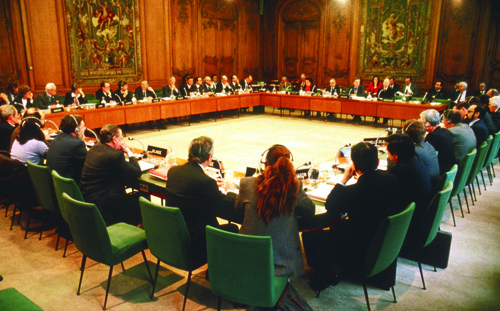
A fascinating new study reveals that students want more input in their education and specifically on the relevance of testing. Ο Κάντε Αξιολόγησης ύλη study underscores that students and teachers place less relevance on high stakes accountability assessments but agree that tests are helpful when they are meaningful to individual learning and useful to classroom instruction in K-12 education. The study also reveals that major gaps persist in teacher assessment literacy and in some cases, that alarmingly different student perceptions exist about the value of assessment based on gender, ηλικία, racial, ethnic and family income. Τελικά, students and educators saw a positive impact in technology-based testing.
Joining me today in Η Σφαιρική Αναζήτηση για Εκπαίδευση to discuss the key findings of Κάντε Αξιολόγησης ύλη: Students And Educators Want Tests That Support Learning, are Matt Chapman, President and CEO of NWEA (Βορειοδυτικό Συλλόγου Αξιολόγησης), Kelly Goodrich, Director of Policy and Advocacy of NWEA, and Peter Grunwald, President of Grunwald Associates.
Matt, please briefly outline the goals of this study.
As the country begins to implement common standards, and the dialogue around the purpose, frequency and delivery of testing has become increasingly heated, we sought to uncover the perspectives of students, teachers and district administrators.
We were very interested in examining the perspectives of students, whose opinions are often unsought and unheard in the development and implementation of educational policies. What we found was both surprising and, we feel, critical to consider as we move forward in developing learner-centered systems at the local, state and national level.


Πέτρος, one concern about testing has been that test prep “interferes with learning”, δηλαδή. teachers and students become too focused on prep for “δοκιμές” which is ultimately detrimental to “μάθηση” ώρα. How did the study define “assessments that are student-focused and used to improve learning”?
We didn’t further define “assessments that are student-focused and used to improve learning” in the study. Our study findings indicate that students and teachers find less value or relevance in high-stakes accountability assessments that are largely used to measure aggregate student performance across states and districts, evaluate educators and programs, and compare groups of students. Φοιτητές do want to know how they are doing as individuals–whether they are meeting learning goals that are important to their education now and in their futures. They want to know what they can do to improve. Teachers want assessments to provide this same information about students and about their own teaching practices. Students and teachers both want timely, actionable results from assessments. And students look to their teachers to help them monitor their progress and for help with their learning.
In our view, assessments that are student-focused and used to improve learning respond to these student and educator priorities. Student-focused assessments are tightly connected to learning expectations, the curriculum and teaching–and relevant to individual students. Such assessments are an integral part of instruction as it is happening, not just afterwards, to gauge student understanding during teaching moments.
Student-focused assessment also means that students receive assessment results they can understand when there is still time to put them to good use. Teachers also should work with students to use assessment results to set learning goals. And teachers should have time to collaborate with their peers to interpret assessment results and use them to adjust and differentiate instructional practices based on identified student needs. Με άλλα λόγια,, student-focused assessment has built-in feedback loops: students are assessed in the course of learning, students and teachers receive quick, actionable results, and these results serve constructive purposes to improve learning.
Κέλλυ, students clearly want to have a voice on assessment and their education. How do you propose we engage students in the decision-making process going forward?
I’d suggest talking with more students – including elementary, middle and high school students – on how they want to be engaged in these important discussions. It is vital to remember that the data that we are discussing is actually student data – students should have a voice in how their own data is used.
At a state level, perhaps state education leaders could establish a representative panel of students to engage when legislation or new policies are being discussed and planned.
On a federal level, perhaps educational assessment organizations and businesses could support a team of students to travel to Washington to help them engage with Congress and policy leaders on specific legislation and policies.


Matt, παιδείας αξιολόγησης για τους εκπαιδευτικούς – σαφώς μελέτη σας εντόπισαν ένα πρόβλημα εδώ. Ποια είναι η μεγαλύτερη διαφορά που βρήκατε και πώς θα λύσει το πρόβλημα?
Βρήκαμε ότι οι εκπαιδευτικοί είναι πολύ καταλαβαίνω όταν πρόκειται για τη χρήση αξιολογήσεων για την ενημέρωση διδασκαλίας. Σύμφωνα με τα στοιχεία μας, η συντριπτική πλειοψηφία των εκπαιδευτικών που χρησιμοποιούν τα αποτελέσματα της αξιολόγησης για να ρυθμίσετε διδακτικές στρατηγικές (74%), σχεδιάζουν και να διαφοροποιούν τη διδασκαλία για την υψηλή, μέση τιμή, και χαμηλής απόδοσης φοιτητές.
Ωστόσο,, κάναμε εντοπίσει κάποια κενά μεταξύ των εκπαιδευτών στην κατανόηση των διαφόρων τύπων και τους σκοπούς της αξιολόγησης και καθώς και ευρεία συμφωνία στην ανάγκη για περισσότερη προετοιμασία προϋπηρεσιακή στην αξιολόγηση και τον χρόνο για την επαγγελματική συνεργασία γύρω από τα αποτελέσματα της αξιολόγησης.
We see a need to provide teachers with more pre- and in-service time and resources, και περισσότερο χρόνο για τη συνεργασία να μεγιστοποιηθεί το όφελος μπορούν να αποκομίσουν από την αξιολόγηση στην πράξη τους.
Πέτρος, Κάνατε κάποια έρευνα σχετικά με τη συχνότητα των δοκιμών – τι λειτουργεί? What is considered too much?
We did not ask respondents specifically about the frequency of testing. We did find, ωστόσο, interesting trends around the perspectives of the amount of time spent on testing. Σε 2011, 28 percent of teachers and 29 percent of district administrators believed that students spent “just the right amount” of time on assessments. Σε 2013, despite the intense national dialogue on this subject, those numbers show marked increases for both groups–38 percent for teachers and 48 percent for district administrators.
Ωστόσο,, there are disparities about time spent preparing for and taking different kinds of assessments, with teachers (70 τοις εκατό) and district administrators (55 τοις εκατό) saying in 2013 that the focus on state accountability tests takes too much time away from learning.


Κέλλυ, why do you think a larger percentage of African American, Asian and Hispanic students believed state accountability tests are very important to their futures compared to just 47 percent of white students?
This is a compelling finding. As to why this is, that was beyond the purview of this survey, but clearly points to an opportunity for the education research community to explore the issue in greater depth. Understanding the reasons for this may well help us unlock greater outcomes for all students.
Κέλλυ, what steps need to be taken to expand technology readiness in every district?
Students and teachers let us know in their survey responses that they see a silver lining in the struggles to implement technology in the classroom, especially for delivering assessments. The early efforts, while not perfect, have allowed us to see the positive impact of technology based assessments – faster test delivery, faster delivery of results, greater student engagement – για να αναφέρουμε μερικά.
While additional funds are probably required, perhaps we can make this work more efficiently by establishing new metrics that really demonstrate school readiness for technology and new devices, beyond just Internet access. When we have clear information on what is needed, we can better prepare a plan that defines resources and goals.
This work will likely require partnerships – perhaps between very different organizations – to fund and support the implementation of this important change to our K-12 classrooms.
For more information on the Make Assessment Matter study: http://www.nwea.org/makeassessmentmatter


All photos are courtesy of NWEA
Στο παγκόσμιο Αναζήτηση για Εκπαίδευση, μαζί μου και παγκοσμίως γνωστή ηγέτες σκέψης συμπεριλαμβανομένου του Sir Michael Κομμωτήριο (Ηνωμένο Βασίλειο), Ο Δρ. Michael Block (ΗΠΑ), Ο Δρ. Leon Botstein (ΗΠΑ), Καθηγητής Clay Christensen (ΗΠΑ), Ο Δρ. Linda Ντάρλινγκ-Hammond (ΗΠΑ), Ο Δρ. Madhav Chavan (Ινδία), Ο καθηγητής Michael Fullan (Καναδάς), Ο καθηγητής Howard Gardner (ΗΠΑ), Ο καθηγητής Andy Hargreaves (ΗΠΑ), Ο καθηγητής Yvonne Hellman (Η Ολλανδία), Ο καθηγητής Kristin Helstad (Νορβηγία), Jean Hendrickson (ΗΠΑ), Καθηγητής Rose Hipkins (Νέα Ζηλανδία), Καθηγητής Cornelia Hoogland (Καναδάς), Αξιότιμο Jeff Johnson (Καναδάς), Η κ. Chantal Kaufmann (Βέλγιο), Ο Δρ. Eija Kauppinen (Φινλανδία), Υφυπουργός Tapio Kosunen (Φινλανδία), Ο καθηγητής Dominique Λαφοντέν (Βέλγιο), Ο καθηγητής Hugh Lauder (Ηνωμένο Βασίλειο), Καθηγητής Ben Levin (Καναδάς), Lord Ken Macdonald (Ηνωμένο Βασίλειο), Καθηγητής Barry McGaw (Αυστραλία), Shiv Nadar (Ινδία), Καθηγητής R. Natarajan (Ινδία), Ο Δρ. PAK NG (Σιγκαπούρη), Ο Δρ. Denise Πάπα (ΗΠΑ), Sridhar Rajagopalan (Ινδία), Ο Δρ. Diane Ravitch (ΗΠΑ), Richard Wilson Riley (ΗΠΑ), Sir Ken Robinson (Ηνωμένο Βασίλειο), Καθηγητής Pasi Sahlberg (Φινλανδία), Καθηγητής Manabu Sato (Ιαπωνία), Andreas Schleicher (PISA, ΟΟΣΑ), Ο Δρ. Anthony Seldon (Ηνωμένο Βασίλειο), Ο Δρ. David Shaffer (ΗΠΑ), Ο Δρ. Kirsten Μοναδική Are (Νορβηγία), Στήβεν Spahn (ΗΠΑ), Yves Theze (Lycee Francais Η.Π.Α.), Ο καθηγητής Charles Ungerleider (Καναδάς), Ο καθηγητής Tony Wagner (ΗΠΑ), Sir David Watson (Ηνωμένο Βασίλειο), Καθηγητής Dylan Γουίλιαμ (Ηνωμένο Βασίλειο), Ο Δρ. Mark Wormald (Ηνωμένο Βασίλειο), Ο καθηγητής Theo Wubbels (Η Ολλανδία), Ο καθηγητής Michael Young (Ηνωμένο Βασίλειο), και ο καθηγητής Minxuan Zhang (Κίνα) καθώς εξερευνούν τα μεγάλα ζητήματα της εκπαίδευσης εικόνα που όλα τα έθνη αντιμετωπίζουν σήμερα.
Η Παγκόσμια αναζήτηση για την Εκπαίδευση της Κοινότητας Σελίδα
C. M. Rubin είναι ο συγγραφέας των δύο πολυδιαβασμένα online σειρά για την οποία έλαβε ένα 2011 Βραβείο Upton Sinclair, “Η Σφαιρική Αναζήτηση για Εκπαίδευση” και “Πώς θα μας Διαβάστε?” Είναι επίσης ο συγγραφέας του μπεστ σέλερ τρία βιβλία, Συμπεριλαμβανομένων Η Ρεάλ Αλίκη στη Χώρα των Θαυμάτων, Είναι ο εκδότης του CMRubinWorld, και είναι ένα Ίδρυμα Fellow δι'υπερήχων.
Ακολουθήστε C. M. Rubin στο Twitter: www.twitter.com/@cmrubinworld






Πρόσφατα σχόλια